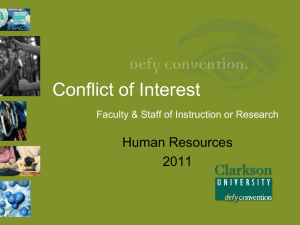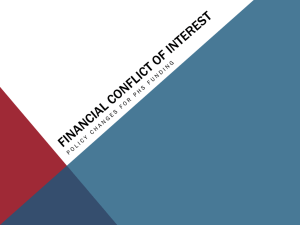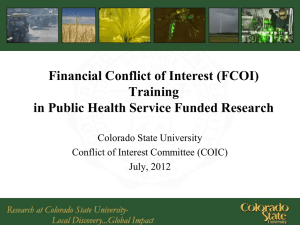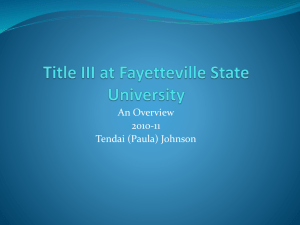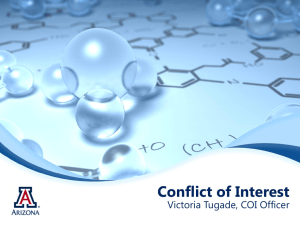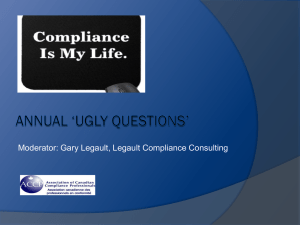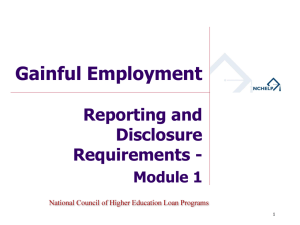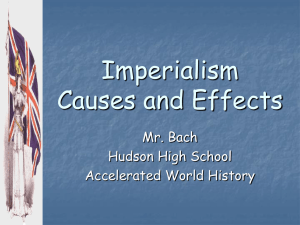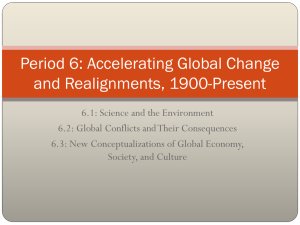CREATE - Office of Research
advertisement
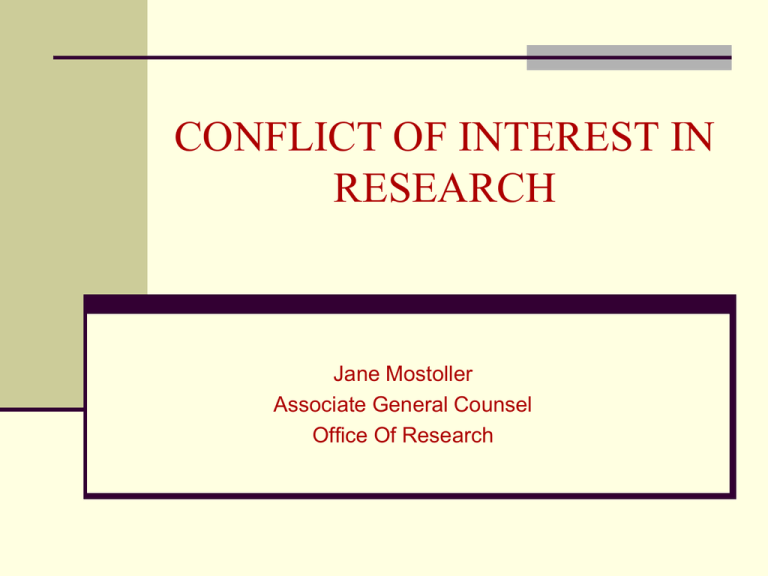
CONFLICT OF INTEREST IN RESEARCH Jane Mostoller Associate General Counsel Office Of Research OBJECTIVE Access to information regarding conflict of interest Knowledge of basic concepts of conflict of interest in research BASIC FOUNDATIONAL DEFINITION: Section 4: Human Resources Department of the FSU Faculty Handbook Applies to all university employees (derived from Board of Regents policy) No employee of the State University System shall have any interest, financial or otherwise, direct or indirect; engage in any business transaction or professional activity; or incur any obligation of any nature which is in substantial conflict with the full and competent performance of his duties in the public interest. All employees of the State University System are governed by the provisions of Section 112.313, Florida Statutes, setting standards of conduct for public officers and employees of agencies, and Section 112.3145, Florida Statutes, mandating the disclosure of certain financial interests. CONFLICT OF INTEREST HEADLINES AND EVENTS: Conflicts of Interest bedevil psychiatric drug research – USA Today 6/2/2009 UM Professor Reprimanded for Apparent Conflict of Interest – The Baltimore Sun 1/23/2010 Baylor College of Medicine Faces NIH Sanctions over Financial Conflicts – The Chronicle of Higher Education 1/20/2010 Board Disciplines 3 Doctors for failure to disclose financial interests in medical device – The New York Times 5/3/2011 Top Psychiatrist Failed to Report Drug Income – The New York Times 10/4/2008 CONFLICT OF INTEREST MAY BE REGULATED BY: Federal Regulations State Statute University Policy FEDERAL REQUIREMENTS NIH and NSF Conflict of Interest regulations implemented in 1995 The result of public concern – Series of press reports of incidents where outside activity appeared to influence research results Compromised confidence in research Department of Heath and Human Sciences issued an updated Final Rule on COI revising the 1995 regulations in August 2011. Institutions have one year to implement the new regulations. FEDERAL REQUIREMENTS The revised regulations: Require investigators to disclose to their institution all Significant Financial Interests Lower the monetary threshold of SFI from $10,000 to $5,000 Require institutions to report additional information on identified financial COI and how they are being managed Require institutions to make certain info accessible to the public concerning identified SFIs held by senior/key personnel Require investigators to complete training related to the regs and their institution’s financial conflict of interest policy FEDERAL REQUIREMENTS Department of Health and Human Services (DHHS) through Public Health Services (PHS) which is the federal agency over NIH, implemented particular regulation changes effective August 24, 2012, and FSU revised its NIH conflict of Interest policy as a new PHS Conflict of Interest Policy. Information related to the new PHS policy can be found at http://www.research.fsu.edu/researchcomplia nce/phs.html FEDERAL REQUIREMENTS Note that this website contains the PHS /FSU Policy on Conflict of Interest, the online Training Module for Investigators, and the Disclosure Reporting form – accessed through the Electronic Disclosure Management System (EDMS). KEY DEFINITIONS: Disclosure of Significant Financial Interests means an Investigator’s disclosure of significant financial interests to an Institution. Entity means any domestic or foreign, public or private, organization (excluding a federal agency) from which an Investigator (and spouse and dependent children) receives remuneration or in which any person has an ownership or equity interest. Financial conflict of Interest (FCOI) means a significant financial interest that could directly and significantly affect the design, conduct, or reporting of PHS-funded research. FCOI report means an Institution’s report of a financial conflict of interest to a PHS Awarding Component. Financial Interest means anything of monetary value, whether or not the value is readily ascertainable. KEY DEFINITIONS: Institutional responsibilities means an Investigator’s professional responsibilities on behalf of the Institution such as research, research consultation, teaching, professional practice, institutional committee memberships, and service on panels such as Institutional Review Board or Data and Safety Monitoring Boards. Investigator means the project director or principal investigator and any other person, regardless of title or position, who is responsible for the design, conduct, or reporting of research, including collaborators or consultants. Institutional Official means the individual within FSU that is responsible for the solicitation and review of disclosures of significant financial interests of Investigators and those of the Investigator’s spouse and dependent children related to the Investigator’s institutional responsibilities. For the purposes of this policy, the Institutional Official shall be designated by the Vice President for Research. Manage means taking action to address a financial conflict of interest, which includes reducing or eliminating the financial conflict of interest, to ensure, to the extent possible, that the design, conduct, and reporting of research will be free from bias. KEY DEFINITIONS: PD/PI means a project director or Principal Investigator of a PHS-funded research project; the PD/PI is included in the definition of Investigator. PHS means the Public Health Service of the U.S. Department of Health and Human Services (HHS), and any components of the PHS to which the authority involved may be delegated. The components of the PHS include, but are not limited to, the Administration for Children and Families, Administration on Aging, Agency for Healthcare Research and Quality, Agency for Toxic Substances and Disease Registry, Centers for Disease Control and Prevention, Federal Occupational Health, Food and Drug Administration, Health Resources and Services Administration, Indian Health Service, National Institutes of Health, and Substance Abuse and Mental Health Services Administration. PHS Awarding Component means the organizational unit of the PHS that funds the research that is subject to the subpart. Research means a systematic investigation, study or experiment designed to develop or contribute to generalizable knowledge. Significant Financial Interest(SFI) Significant Financial Interest (SFI) means a financial interest consisting of one or more of the following interests of the Investigator (and those of the Investigator’s spouse and dependent children) that reasonably appears to be related to the Investigator’s institutional responsibilities: With regard to a publicly traded entity, a SFI exists if the value of any remuneration received from the entity in the twelve months preceding the disclosure and the value of any equity interest in the entity as of the date of disclosure, when aggregated for a single entity, exceeds $5,000. Remuneration in this section includes salary and any payment for services not otherwise identified as salary (such as consulting fees, honoraria, paid authorship); equity interest includes any stock, stock option, or other ownership interest, as determined through reference to public prices or other reasonable measure of fair market value; With regard to any non-publicly traded entity, a SFI exists if the value of any remuneration received from the entity in the twelve months preceding the disclosure, when aggregated for a single entity, exceeds $5,000, or when the Investigator (or the Investigator’s spouse or dependent children) holds any equity interest (e.g. stock, stock option, or other ownership interest); or Intellectual property rights and interests (e.g. patents, copyrights), upon receipt of income related to such rights and interests, which exceeds $5,000 from a single entity. Travel (TR) Investigators also must disclose the occurrence of any reimbursed or sponsored travel (i.e. that which is paid on behalf of the Investigator and not reimbursed to the Investigator so that the exact monetary value may not be readily available), related to their institutional responsibilities; provided, however, that this disclosure requirement does not apply to travel that is reimbursed or sponsored by a Federal, state, or local government agency, an Institution of higher education as defined at 20 U.S.C. 1001(a), an academic teaching hospital, a medical center, or a research institute that is affiliated with an Institution of higher education. The de minimus threshold does not apply for the reporting of travel. The disclosure of reimbursed or sponsored travel must include the purpose of the trip, the identity of the sponsor/organizer, the destination, the duration, and monetary value, in order to determine whether a FCOI may exist with the research endeavor. The term “significant financial disclosure” does not include the following types of financial interests: salary, royalties, or other remuneration paid by the Institution to the Investigator if the Investigator is currently employed or otherwise appointed by the Institution, including intellectual property rights assigned to the Institution and agreements to share in royalties related to such rights, income from investment vehicles such as mutual funds and retirement accounts, as long as the Investigator does not directly control the investment decisions made in these vehicles income from seminars, lecture, or teaching engagements sponsored by a Federal, state, or local government agency, an Institution of higher education as defined at 20 U.S.C. 1001(a), an academic teaching hospital, a medical center, or a research institute that is affiliated with an Institution of higher education, or income from service on advisory committees or review panels for a Federal, state, or local government agency, an Institution of higher education as defined at 20 U.S.C. 1001(a), an academic teaching hospital, a medical center, or a research institute that is affiliated with an Institution of higher education. FEDERAL REQUIREMENTS for NSF A principal investigator and all others with substantial research responsibilities must file a financial disclosure form with the University by the time a grant application is submitted which identifies any significant financial interests of the PI, his or her spouse and dependent children that would reasonably appear to be affected by the proposed research, or is an outside interest that would reasonably appear to be affected by the research. FEDERAL REQUIREMENTS for NSF Significant financial interests are: Any sort of compensation, in cash or other form, for services to an individual and his or her immediate family, the value of which exceeds $10,000 in a one-year period; or An equity interest which exceeds $10,000 or which exceeds a five percent ownership interest. Example: An investigator owns stock in a company providing the research funding or an investigator has an ownership interest in a company that may profit from a university invention Conflicting interests are not necessarily unacceptable, and many can be managed through disclosure and oversight. NSF requires that institutions report only those conflicts that have not been resolved. FSU Significant Financial Interest Disclosure Form for NSF Available through Sponsored Research Services website www.research.fsu.edu/contractsgrants/forms.html FEDERAL REQUIREMENTS for NSF Institution is required to: Review all financial disclosures Determine whether a conflict exists Determine what action should be taken to manage, reduce or eliminate such conflicts FEDERAL REQUIREMENTS Citations: http://grants.nih.gov/grants/policy/coi/ National Science Foundation s. 510 Grant Policy Manual OTHER CONFLICTS OF INTEREST IN FEDERALLY FUNDED RESEARCH DHHS - Human Subjects Research (committee member conflict of interest). No IRB may have a member participate in review of any project in which the member has a conflicting interest. FDA - Clinical Investigation/Trials (committee member conflict of interest) and financial disclosure by clinical investigators and sponsor(s). FARS Subpart 9.5 Organizational and Consultant Conflicts of Interest AAMC Report 2002 – Conflict of Interest in Human Subject Research “ With the welfare of research subjects always of foremost concern, an institution should regard all significant financial interests in human subjects research as potentially problematic and therefore, as requiring close scrutiny. Institutional policies should establish the rebuttable presumption that an individual who holds a significant financial interest in research involving human subjects may not conduct such research.” DHHS Report 2004 – Conflict of Interest in Human Subjects Research Final guidance touches on individual conflicts of interest as well as institutional conflicts of interest. “Ipso facto” circumstances Definition- “By that very fact” New direction – federal concern expands from disclosure of individual conflicts of interest (NIH and NSF) to include institutional conflicts of interest (AAMC, AAU, DHHS reports) Death of Jesse Gelsinger was pivotal in expanding need for disclosure. Institutional Conflict of Interest AAU report (2001) indicates that an institutional financial conflict of interest may occur when the institution or an affiliated foundation or organization, has an external relationship or financial interest in a company that itself has a financial interest in a faculty research project. Current Reality: Institutions must manage two types of conflicts of interest: Individual Institutional GAO Report 2003 – Shift from Individual conflicts of interest to institutional conflicts of interest. University Research is a vital part of the nation’s research and development efforts. The federal government has been the primary source of funding for this research. Historically the primary return on the federal government’s investment in university research was the advancement of scientific knowledge. Science progresses through open communication among scientists and the sharing of research results. The federal investment in university research not only has advanced scientific knowledge but also has yielded thousands of inventions each year. For some universities, it has also yielded new streams of income that helped to support their research and education missions. University ownership of inventions and the right to license to businesses has created partnerships between universities and businesses, giving rise to concerns that financial conflicts of interest might restrict the dissemination of research results or bias the conduct or results of federally funded research. (Potential for institutional conflicts of interest). State Regulation of Conflicts of Interest: Part III, Chapter 112, Florida Statutes – Code of Ethics for Public Officers and Employees Section 112.311, F.S. “It is essential to the proper conduct and operation of government that public officials be independent and impartial and that public office not be used for private gain other than the remuneration provided by law”. At the same time the legislature recognized that public officials and state employees should not be “denied the opportunity to acquire and retain private economic interests except when conflicts with the responsibility of such officials to the public cannot be avoided”. Thus the Code is designed to “protect against any conflict of interest and establish standards for the conduct of elected officials and government employees in situations where conflicts may exist”. Conflict of Interest Definition Means a situation in which regard for a private interest tends to lead to a disregard of a public duty or interest. Section 112.312(8), F.S. Key prohibitions from the statute are: Misuse of position Use of information Gifts and honoraria Doing business with the university Conflicting employment and contractual relationships Exemptions from the prohibited activities: Competitive bid with disclosure to the Florida Department of State Sole source purchases Certain goods and services, emergency purchases Transactions of less than $500.00 per calendar year Research and license agreements ( in effect at FSU for a faculty researcher) (Disclosure of Financial Interests and Post Employment Restrictions and Penalties) Sources for more information Florida Commission of Ethics- opinions http://www.ethics.state.fl.us Florida Attorney General’s Office – interpretation and applicability http://myfloridalegal.com/opinions FSU Policies – Faculty Handbook Sections 4: Human Resources DepartmentConflict of Interest (http://www.facultyhandbook.fsu.edu/section4.html) No faculty member should engage in any regular or intermittent activity which interferes with the full discharge of the academic responsibilities of teaching, research, and service. No faculty member or staff member shall engage in any outside activity which interferes with the full performance of his or her assigned duties. Such activities shall not create a conflict of interest, which is defined in Chapter 112.312 to mean a situation in which regard for a private interest tends to lead to disregard of a public duty or interest. Before engaging in any outside activity that may create a conflict of interest, the faculty or staff member shall submit to the department chairman or appropriate supervisor a written statement of the FSU Outside Employment Statement Form. (http://hr.fsu.edu) Forms Index “Outside Activity” Any private practice, private consulting, additional teaching or research, or other activity, compensated or uncompensated, which is above and beyond a faculty or staff member’s assigned duties, and for which the University has provided no compensation. Prohibitions in FSU Conflict of Interest Policy flow directly from Section 112.313, F.S. (Exception: Use of textbook – See FSU Handbook) Exemptions in the FSU Conflict of Interest Policy flow directly from Section 112.313(12), F.S. The determination of whether or not and to what extent a given outside activity of a faculty or staff member interferes with the performance of assigned duties is the responsibility of the person’s chairman or appropriate supervisor who is expected to apply sound professional judgment based upon standard practice in the particular field or discipline. Contact Jane Mostoller, Associate General Counsel, Office Of Research E-mail jmostoller@fsu.edu Phone 644-0284 Fax 644 4392 Location: 2010 Levy Avenue Building B Suite276 Innovation Park Tallahassee, FL 32306-2742 CAMPUS MAIL CODE: 2742
